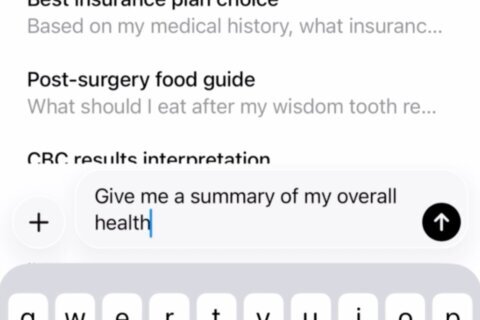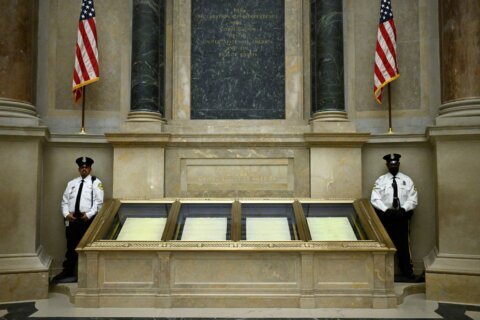WASHINGTON — Commuters who exit the Gallery Place/Chinatown Metro stop at 9th and G streets in Northwest are greeted by a familiar voice every morning.
“The first thing you hear when you hit the Metro is, ‘Good morning, good morning.’ They love when I say that,” says Gerald Anderson.
Anderson, 47, has been selling Street Sense, D.C.’s biweekly street newspaper, at the same spot for the past few years. But these days, he’s selling more than newspapers — he’s selling his first book as well.
—
When Anderson came to D.C. 10 years ago, he was in a much different place from where he is today. He arrived on an evacuation flight from New Orleans shortly after Hurricane Katrina left his hometown in ruins.
Due to his long criminal past, he was denied housing, so he bounced between hotel rooms, friends’ homes and the streets, until he landed in prison yet again.
When Anderson finished serving time, he met someone who sold Street Sense, which is written and distributed by the homeless community. Anderson was convinced that getting a job with the paper would keep him out of jail and provide a steady income.
“I said to myself, ‘Either I’m going to live like this for the rest of my life, or I’m going to get it together.’”
Anderson quickly grew to love his job, mostly because of the people. He says greeting and interacting with his customers is the highlight of his day, and he considers many of his regulars to be like family.
“Things got more and more and more better for me,” Anderson says.
And it continued that way.
In early 2014, Anderson’s title changed from “vendor” to “author” when he met award-winning journalist Susan Orlins.
Orlins, a Northwest D.C. resident, showed up to Street Sense for her first day as a volunteer editor and immediately spotted Anderson. He was hunched over in the corner, scribbling away on a piece of paper.
Anderson told Orlins he was writing a thank-you note to his customers who pooled their airline miles together so he could fly back to New Orleans — his first trip back home since Katrina.
That’s when Orlins knew Anderson had a story to share.
—
Anderson was born and raised in New Orleans. He grew up in poverty, and spent the majority of his life in and out of prison.
“I just stayed in trouble a lot. I didn’t finish school, which I wish I would have,” says Anderson, who has a seventh-grade education.
Three weeks before Hurricane Katrina hit New Orleans, Anderson was released from the Louisiana State Penitentiary. Immediately, he says, he slipped back into his old ways, and began planning places to rob once the city was evacuated.
“I was thinking about the bank I could break in — I was thinking criminal mind. I was going to get some money,” he says.
But when he witnessed the destruction caused by Katrina, he abandoned his original plans and put the skills he learned in prison to good use, instead.
Anderson and his friends found a boat in an abandoned home and a few boards in the garage, which they used to paddle through the floodwaters to rescue victims. He delivered food dropped by the National Guard to those holed up in the projects and looked after stranded families.
“Sometimes when I see rain down here, people will ask, ‘Why are you walking in the rain?’ I tell them, ‘That ain’t no rain; that’s just little drops.’ What I went through, and what a lot of other people went through, that was rain. That was more than rain,” he says.
Eventually, Anderson was put on an evacuation flight to D.C. — it was his first time on a plane. Sandwiched between other victims and their household pets, he was showered with sweets, sodas and other special perks.
“They tried to do everything they could to keep our minds off it. It didn’t work.”
But he made it to D.C.
—
It took some convincing on behalf of Orlins, 69, to get Anderson to open up about his time spent in the floodwaters of Katrina. He finally agreed, and the two got to work in January 2014.
Anderson and Orlins met every Wednesday at a window seat in a Starbucks on 9th Street. Orlins would bring her laptop and a few egg salad sandwiches, and Anderson would recount his stories while she typed.
Over time, the two developed more than a memoir — they fostered a friendship.
“Our bond is so close, if I get a girlfriend, Susan will be the first to know,” Anderson says, adding that he knows he can count on Orlins for anything.
That statement proved true in May 2014, when Anderson was subpoenaed to court for missing two urine tests. He had been using drugs again, and feared he’d have to give up his job and his writing and go back to prison.
Orlins showed up in court that morning to support Anderson. The judge was handed letters of support from Anderson’s customers, and a photo of he and Orlins being interviewed on TV.
Instead of sentencing Anderson to jail, the judge ordered him to a residential drug rehabilitation program, which provided him a place to live, as well as help to combat drug addiction. Anderson was able to keep his job and finish his book, called “Still Standing,” which he and Orlins published in 2015.
Shortly after the book was published, Orlins set up an appointment for Anderson to meet with that judge. Anderson brought along a copy of the book to show the judge what he was able to accomplish.
“I handed her the book and showed her the last page and said, ‘If it wasn’t for you, I never would have made it.’”
Anderson has been clean for more than a year, and was recently awarded Phoenix House’s Alumni of the Year. His accomplishments are a source of inspiration for other members of the homeless community, as well as those in drastically different situations.
One of Anderson’s customers, a government employee, told Anderson he always wanted to publish a book, but never could get it done. Orlins says other Street Sense employees have approached her about writing their stories as well.
Anderson, who now lives in Arlington, says he might have another book in him — Orlins is intrigued by his prison stories — but for now, he wants to help youth steer clear of trouble before it’s too late.
“I’ve gotta give back,” Anderson says. “Old cats used to try to talk to me when I was coming up, and I didn’t want to hear it. I thought I knew it all.”
But he has important advice for today’s teens facing adversity: “Stay in school, don’t use drugs and there’s a spot for you in life. I tell you that because I didn’t think there was a spot for me. And look where I’m at today,” he says.
“Whatever you go through, remember: You’re still standing.”
You can catch Anderson and Orlins at these upcoming book talks:
- Sunday, Oct. 25 at 10 a.m. at the DC Author Festival
- Saturday, Nov. 7 at 1 p.m. at the Tenley-Friendship Library







